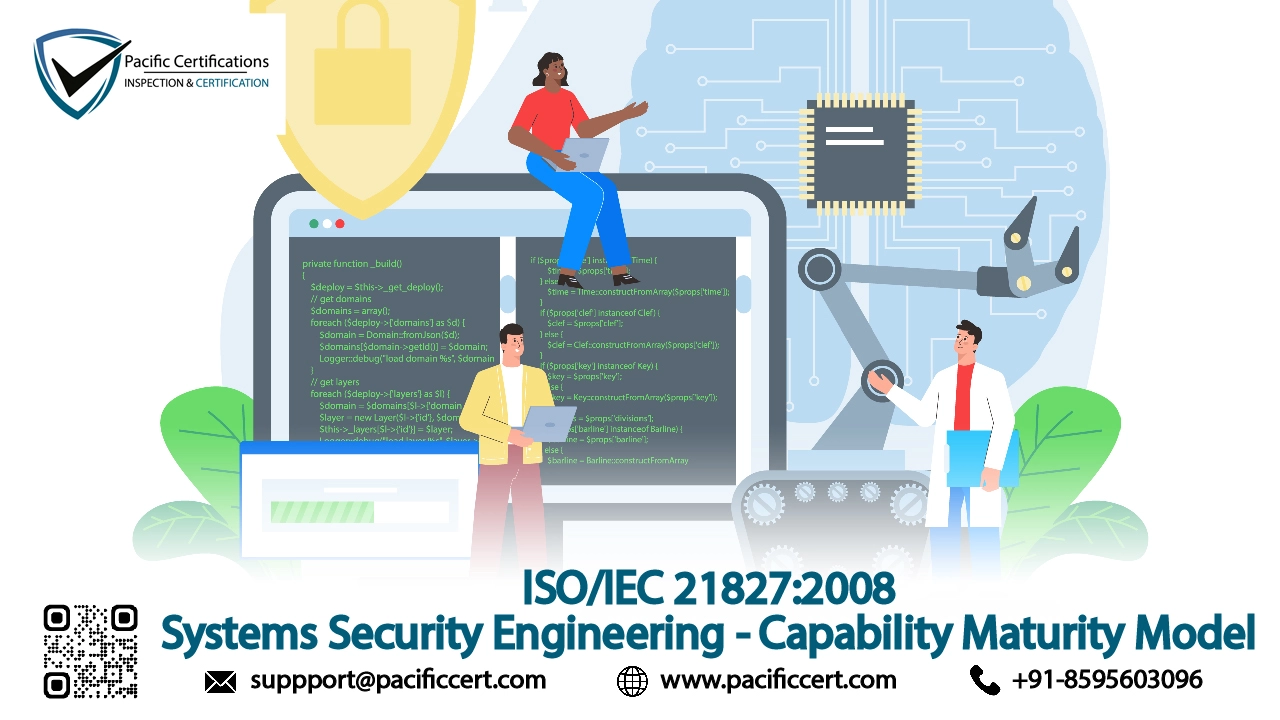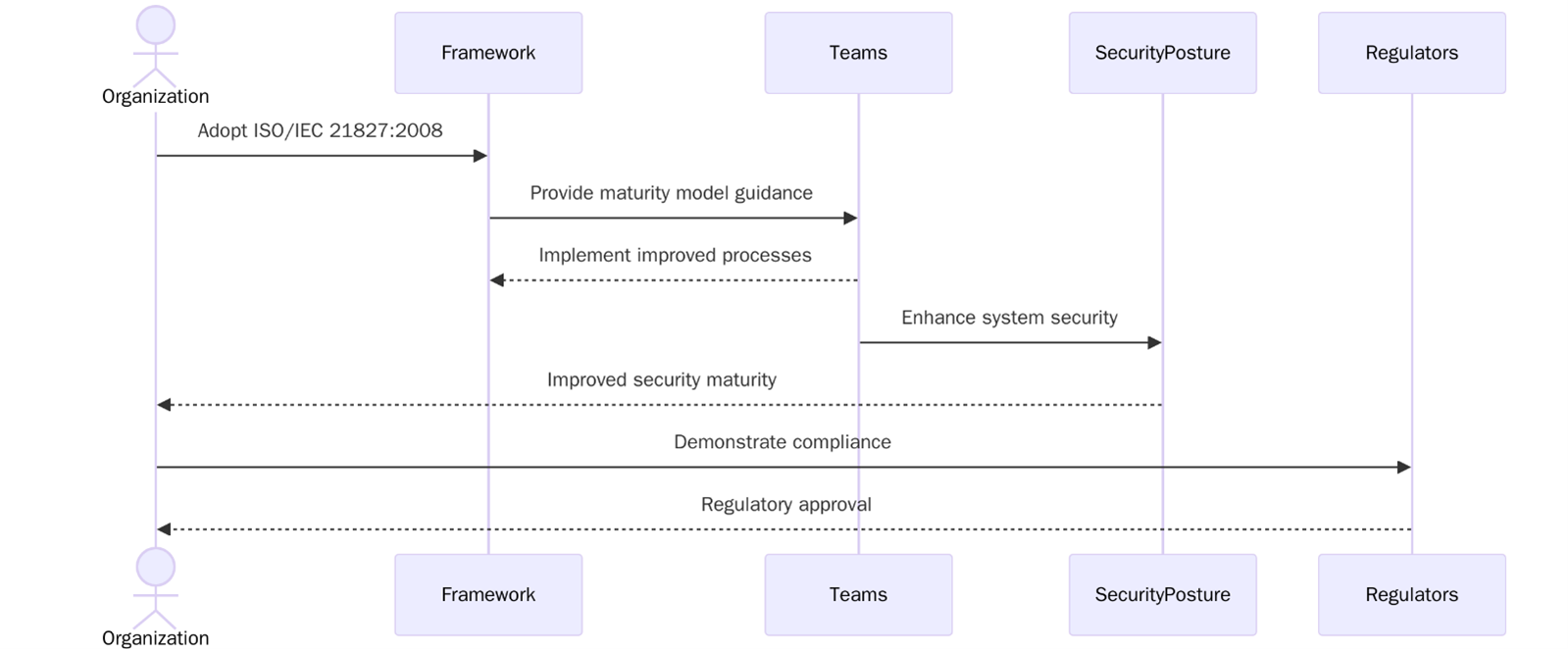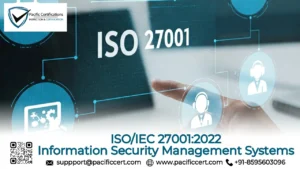What is ISO/IEC 21827:2008?

ISO/IEC 21827:2008 is an international standard that defines the Systems Security Engineering Capability Maturity Model® (SSE-CMM®). It provides a framework for evaluating and improving an organization’s security engineering processes. The model covers the entire lifecycle of systems security, from initial concept through development, operation, and eventual disposal.
Unlike product-specific standards, ISO/IEC 21827 focuses on the processes and practices used to design, implement, and manage secure systems. It supports organizations in achieving consistent, repeatable and measurable security engineering outcomes aligned with organizational goals. This standard is widely adopted in sectors like defence, aerospace, critical infrastructure and IT services where structured security capability is necessary for national and enterprise resilience.

If your organization aims to mature its systems security engineering practices and benchmark them against internationally recognized models, contact support@pacificcert.com to get started.
What is the Purpose of ISO/IEC 21827?
The purpose of ISO/IEC 21827 is to guide organizations in establishing a well-defined, structured, and scalable approach to systems security engineering. Many security failures result from immature, inconsistent, or ad hoc engineering practices. This standard address that gap by introducing a maturity model that organizations can use to assess and improve their security capabilities.
It helps align security practices across development, acquisition, and operations teams. By using ISO/IEC 21827, organizations can move from reactive to proactive approaches, reduce lifecycle risks, and standardize their engineering methodologies. It supports both internal development environments and supplier engagements by providing a unified process maturity benchmark for systems security engineering.
Scope and Applicability
ISO/IEC 21827 is applicable to all organizations involved in the development, deployment, and management of secure systems. It is especially relevant for those operating in complex or high-assurance environments, such as defence contractors, aerospace manufacturers, energy utilities, telecommunications providers and government agencies.
The standard supports engineering efforts across the full system lifecycle – from requirements definition to maintenance and system retirement. It can be used by both producers and acquirers of secure systems and is suitable for organizations regardless of size. The model is also beneficial in supply chain management where evaluating the process maturity of third-party vendors is necessary.
Key Definitions
- Capability Maturity Model (CMM): A structured framework for evaluating the maturity of an organization’s processes in a specific domain.
- Systems Security Engineering (SSE): The discipline of applying engineering principles to the design, development, and lifecycle management of secure systems.
- Process Area: A cluster of related security practices that achieve a set of goals necessary for security maturity.
ISO/IEC 21827:2008 Clauses-wise structure
Clause | Title | Description |
1 | Scope | Defines the scope, focus, and intended application of the SSE-CMM model |
2 | Normative References | Lists supporting and referenced standards that complement the model |
3 | Terms and Definitions | Provides terminology related to capability, maturity, and systems engineering |
4 | Framework Overview | Describes the structure of the model including levels and process areas |
5 | Process Areas | Outlines key process areas grouped into engineering, project, and organizational |
6 | Capability Levels | Explains maturity levels from Level 0 (Incomplete) to Level 5 (Optimizing) |
7 | Appraisal and Assessment Guidelines | Details methods for evaluating and benchmarking process maturity |
What are the requirements of ISO/IEC 21827:2008?
Before applying the standard, organizations must understand that ISO/IEC 21827 is not a checklist of controls, but a framework for maturing the processes used to engineer secure systems. The requirements revolve around consistent process execution, management and optimization. Below are some of the key requirements:

- Identify process areas across engineering, project management and organizational support.
- Assess current process maturity against the five levels (Incomplete, Performed, Managed, Defined, Optimizing).
- Establish repeatable practices that are documented and aligned with business objectives.
- Implement internal controls for managing project plans, risks, resources and quality.
- Define performance metrics to track progress and evaluate effectiveness.
- Foster cross-functional collaboration between engineering, security and quality teams.
- Continually refine processes based on feedback, audits and performance data.
These steps are iterative, and organizations may progress gradually through maturity levels based on strategic goals and resource capabilities.
What are the benefits of ISO/IEC 21827:2008?
Before implementing ISO/IEC 21827, organizations should recognize its long-term value. Rather than delivering immediate compliance outcomes, the standard builds process discipline that leads to measurable improvements in systems security over time. Below are some of the key benefits:

- Improved process maturity across security, engineering, and project functions
- Stronger risk management throughout the system development lifecycle
- Better supplier evaluation and assurance through standardized maturity assessments
- Lower incident rates due to consistent and preventive design controls
- Increased stakeholder confidence in system integrity and process repeatability
- improved integration with ISO/IEC 27001, ISO 9001, and other management systems
In the upcoming years, process maturity models have become important for organizations managing critical systems. According to the International Systems Security Engineering Consortium, over 45% of defence and aerospace firms have adopted ISO/IEC 21827 or similar maturity models. The rise in cyber-physical systems, digital twins and mission-critical software has made systems security engineering maturity a board-level topic.
In government procurement, CMM-based evaluations are becoming a prequalification requirement. Similarly, regulated industries are increasingly asking suppliers to show maturity through formal appraisals. These shifts highlight the growing importance of ISO/IEC 21827 as a baseline for structured, secure engineering.
Certification Process and Procedure
As ISO/IEC 21827 is not certifiable, it does not follow a formal third-party certification process. However, it can be integrated into ISO/IEC 27001 or ISO 9001 certified systems, and many organizations conduct internal appraisals or third-party maturity evaluations based on this model.
Typical steps include:
- Initial Assessment – Benchmark current maturity across process areas
- Gap Identification – Determine where practices fall short of the desired level
- Improvement Planning – Develop action plans with owners, KPIs, and timelines
- Implementation – Institutionalize and repeat practices for consistency
- Validation – Conduct internal or external maturity reviews periodically
For audit support or help aligning your maturity roadmap with ISO/IEC 21827, contact our team at support@pacificcert.com
Certification Timeline
Because ISO/IEC 21827 focuses on process maturity rather than conformity, the timeline depends on your target capability level. Moving from an ad hoc to a defined or managed state could take 6–12 months depending on your team’s engagement, current process maturity, and available resources.
In organizations already following ISO/IEC 27001 or ISO 9001, integrating the SSE-CMM model may take 3–6 months to establish baseline practices and complete initial assessments. Full optimization may span multiple years depending on the level of change required and organizational priorities.
ISO/IEC 21827 Certification Cost of Implementation
Costs for applying ISO/IEC 21827 vary widely based on organizational size, existing maturity, and desired outcomes. Initial costs typically involve capability assessments, training, and the development of standardized process documentation. Longer-term costs include tool development, change management, and integration with existing governance frameworks.
Organizations that already have structured management systems in place may incur lower implementation costs. External appraisals or benchmarking engagements also contribute to overall investment.
How Pacific Certifications Can Help?
While ISO/IEC 21827 is not certifiable, Pacific Certifications supports organizations in using this model to strengthen their engineering maturity and improve audit readiness for ISO/IEC 27001, ISO 9001, or related standards. Our offerings include:
- Internal maturity assessments using SSE-CMM models
- Workshops to identify and map process areas to business objectives
- Integration support with existing management systems
- Advisory services during ISO/IEC 27001 or supplier audits
To build a strong foundation for systems security engineering using ISO/IEC 21827, contact support@pacificcert.com
ISO/IEC 21827 Training and Courses
Organizations looking to implement ISO/IEC 21827 effectively can benefit from structured training:
- Lead Auditor Training– Understand the five maturity levels and their applications
- Lead Implementer Training – Apply the model within ISO/IEC 27001 or product lifecycles
- Internal Auditor Training– Equip internal teams to conduct maturity appraisals
Pacific Certifications offers accredited programs to support internal learning and external assurance. Reach out to support@pacificcert.com for more details.
FAQs
Is ISO/IEC 21827 a certifiable standard like ISO/IEC 27001?
No, ISO/IEC 21827 is not a certifiable standard. It is a capability maturity model designed to guide organizations in evaluating and improving their systems security engineering practices. While it does not lead to formal certification, organizations can conduct internal or third-party appraisals to assess their maturity level.
Who benefits most from implementing ISO/IEC 21827?
Organizations in sectors that handle complex, mission-critical, or high-assurance systems benefit the most from ISO/IEC 21827. This includes industries such as defence, aerospace, telecommunications, energy, and large-scale IT service providers.
How does ISO/IEC 21827 complement other ISO standards like ISO/IEC 27001 or ISO 9001?
ISO/IEC 21827 provides a process maturity model, whereas ISO/IEC 27001 and ISO 9001 are certifiable management systems standards. By implementing ISO/IEC 21827, organizations can strengthen the process side of their engineering efforts and align those processes with the controls required under ISO/IEC 27001 or the quality focus of ISO 9001.
What is the typical timeframe to reach a defined maturity level using ISO/IEC 21827?
The timeframe varies based on the current maturity of your systems engineering processes and your organization’s size and complexity. Moving from ad hoc practices (Level 1) to a managed or defined state (Level 2 or 3) takes 6 to 12 months. For organizations aiming to reach an optimizing level (Level 5), it could take multiple years and will require sustained investment, cultural buy-in and continuous improvement practices.
Can ISO/IEC 21827 be used to evaluate third-party vendors or suppliers?
Yes, many organizations use ISO/IEC 21827 as a benchmark to assess the maturity of third-party system developers, integrators, or contractors. It helps in supplier selection, risk assessment and contract management by giving insights into how capable a vendor is at consistently delivering secure systems.
Ready to get ISO 1SO/IEC 21827 certified?
Contact Pacific Certifications to begin your certification journey today!
Suggested Certifications –
Read more: Pacific Blogs






